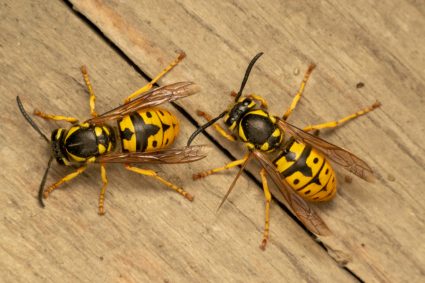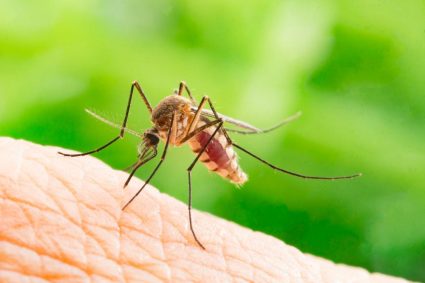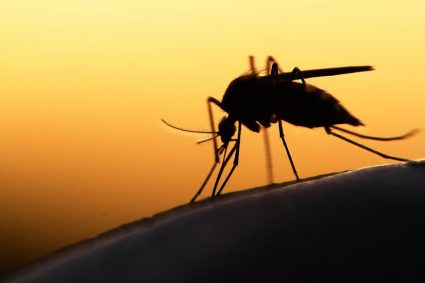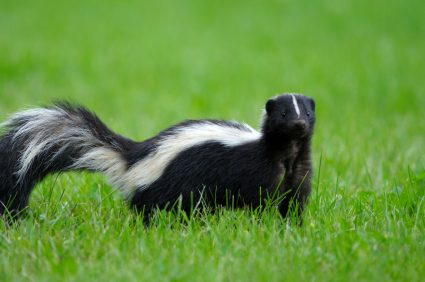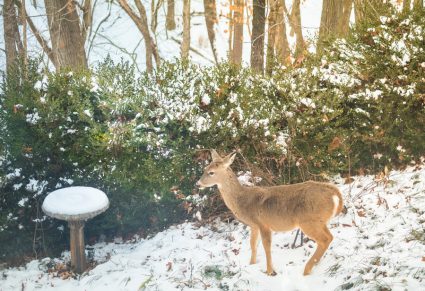
Skunks are known for their distinctive black and white fur and their infamous defense mechanism – a strong, foul-smelling spray used when they feel threatened. While they play a vital role in controlling pests, their presence can be unwelcome due to the potential for spraying, property damage, and health risks like rabies. Here’s a comprehensive guide on how to scare skunks away without getting sprayed.
To scare skunks away without getting sprayed, understand their behavior and make your property less appealing by removing food sources, installing motion-activated lights or sprinklers, using natural repellents like citrus peels or ammonia, and eliminating potential shelters. If a skunk displays warning signs like stamping its front feet or raising its tail, back away slowly and quietly. If a skunk has taken residence in your property, it’s best to contact a professional.
Understanding Skunk Behavior
Skunks are generally shy, non-aggressive creatures that are more interested in foraging for food than causing trouble. They are nocturnal and have poor eyesight, relying more on their sense of smell and hearing. Skunks only spray as a last resort when they can’t escape from a perceived threat. Before they spray, they display warning signs such as stamping their front feet, raising their tail, hissing, and short forward charges. If you spot these signs, it’s best to back away slowly and quietly to avoid getting sprayed.
What Attracts Skunks to Your Property?
Skunks are primarily attracted to residential areas due to the availability of food, water, and shelter. Uncovered garbage, pet food left outside, and easy access to compost piles can draw them in. Gardens and lawns, which are rich in grubs and insects, are also appealing to skunks. They often seek shelter under homes, decks, sheds, and other structures. By addressing these factors, you can make your property less inviting to skunks.
Effective Non-Aggressive Methods to Deter Skunks
Here are several non-aggressive methods to deter skunks from your property:
- Remove food sources: Secure outdoor trash cans, remove pet food, and clean up fallen fruits and birdseed.
- Install motion-activated lights or sprinklers: These can startle skunks and deter them from entering your property.
- Use natural repellents: Skunks dislike strong smells. Items like ammonia-soaked rags, mothballs, or citrus peels can act as natural repellents.
- Create a barrier: Skunks are poor climbers. Installing a low fence around your garden or yard can help keep them out.
- Eliminate potential shelters: Clear your yard of debris, woodpiles, and clutter. Seal off spaces beneath porches, decks, and outbuildings.
Remember to maintain these deterrents regularly to ensure their effectiveness.
Natural Skunk Repellents
Natural repellents are a safe and humane way to deter skunks. Some effective ones include:
- Citrus peels: Skunks dislike the scent of citrus. Scatter citrus peels around your property or create a citrus spray to deter them.
- Capsaicin: This compound, found in spicy peppers, can be used to create a homemade pepper spray.
- Cinnamon: A strong aroma that skunks dislike. Sprinkle cinnamon powder around your property or create a cinnamon spray.
- Ammonia: Soak rags in ammonia and place them in areas where skunks are active. Be cautious as ammonia can be toxic.
- Predator urine: The scent of predators like dogs or coyotes can scare skunks away. You can purchase predator urine or use your pet’s urine.
- Mothballs: Place these at the bottom of your garbage cans or in areas where skunks are active.
Dealing with Skunk Spray
Despite your best efforts, you or your pet might still get sprayed. If this happens, keep the affected individual outside to prevent the smell from spreading indoors. Flush the eyes with cool water if the spray gets in them. Use a skunk odor removal solution to neutralize the smell. You can create a homemade solution with hydrogen peroxide, baking soda, and liquid dish soap, or use commercial skunk odor removers.
In Conclusion
Living harmoniously with wildlife is possible with a little knowledge and precaution. By understanding skunk behavior, making your property less appealing, and using non-aggressive deterrents, you can effectively scare skunks away without getting sprayed. If a skunk has taken residence in your property, it’s best to contact a professional to handle the situation humanely and safely.
Frequently Asked Questions
What time of the year are skunks most active?
Skunks are most active during the warmer months of spring and summer. However, they do not hibernate and can be seen throughout the year, especially on warmer winter nights.
How far can a skunk spray?
A skunk can spray up to 10 feet away. However, under optimal conditions, the spray can reach up to 20 feet.
Are skunks harmful to pets?
While a skunk’s spray is not lethal, it can cause temporary blindness and irritation in pets. Additionally, skunks can carry diseases like rabies which can be harmful to pets if bitten.
Can skunks climb trees or fences?
Skunks are poor climbers. They can climb a bit, but not high or over smooth surfaces. Therefore, installing a low fence can be an effective deterrent.
How long does the smell of a skunk’s spray last?
The smell of a skunk’s spray can last for up to a month if not properly treated. The odor is very persistent and doesn’t easily wash away with water.
Is it legal to kill skunks?
The legality of killing skunks varies by location. It’s always recommended to contact local animal control or a professional pest control service to handle skunk problems. It’s important to handle skunks humanely and avoid causing unnecessary harm.

